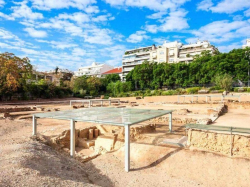Lyceum of Aristotles

Lyceum of Aristotles
The Lyceum of Aristotles originally named after the Sun & Wolf god, Apollo Lyceus. The reason they gathered here was to teach, to examine, as well as to debate about all of life's aspects.
When Aristotle first returned to Athens in the year 335 B.C., he established the school after renting some buildings around the area. He first created the library of Europe, after collecting books from his own travels.
In the Lyceum, Aristotle began to lecture, write philosophical treatises and dialogues until the end of his life. It was Theophrastus that became the head of the school of Lyceum after Aristotle's death in 322 B.C.
Theophrastus continued to lecture and to teach what Aristotle had already established as a school of thought. After Theophrastus died, the library of the Lyceum lost much of its quality due to Neleus of Scepsis, who claimed many of the collection of books and, finally, owned them forever.
In the time of Aristotle, many great philosophers and individuals were in charge of the school, something that made the school itself an open area of thinking and expression, one of the greatest's in human history.
Peripatetic, the most common name for Aristotle's Lyceum, was founded after the Hellenic name "peripatus", which means "walk", something that emerged because of Aristotle's habit to lecture while walking.
The great rival of Plato, a philosopher named Isocrates, was said to teach rhetoric arts in the Lyceum in the middle of the 4th Century B.C. Music, as well as rhapsodies were said to be taught at the Lyceum from other philosophers as well. The Lyceum continued to be one of Athens's gymnasiums, for all kinds of physical exercises and also contained cults of the god Hermes and of Apollo's Muses.
This athletic club was also operating for all kinds of military exercises and it encompassed a very large area of open space right in the middle of Athens, directly below Lycabettus Hill.
It is also written that in Aristotle's Lyceum, the head of the army had his own office. In addition, all troops were said to meet there before every war campaign. In the middle of the 5th Century B.C., the meeting point moved to Pnyx Hill.
Aristotle's Lyceum is found again to be an educational and military institution for the Athenian elite. The name for that elite is "ephiveia", a word that in Greek describes the ages of 18 to 20 years old.
This Athenian aristocracy was provided with the mastery of the arts of war, philosophical instructions for all subjects of life, as well as for mystical and ritual cults of all kinds. Simply put, all of the Mediterranean world of the time had at its center of thought around Aristotle's Lyceum.








